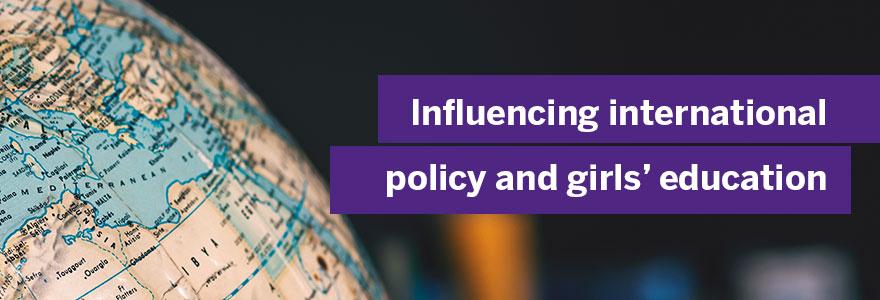
PhD student wins Global Affairs competition

Incoming first-year PhD student Deanna Matthews, with collaborator Professor Prachi Srivastava, have won the International Policy Ideas Challenge from Global Affairs Canada.
Matthews hopes to influence Canada’s Feminist International Assistance Policy (FIAP) with respect to girls’ education.
“We were incredibly excited, said Matthews. “It’s unusual for researchers at a Faculty of Education to win this type of award because there are so few Faculties across Canada focusing on education within the context of international development.”
FIAP officially funds development assistance into girls’ activities, such as health and education. As part of its policy, the federal government engages in private-sector partnerships to attract co-financing and investment. The goal is to identify new solutions to development challenges while creating more economic opportunities for the poorest and most vulnerable.
The International Policy Ideas Challenge invites graduate students and post-doctoral scholars from Canadian post-secondary institutions to identify concrete, innovative solutions to emerging international policy challenges that face Canada.
As one of 10 winners from across the country, Matthews will develop and present a policy brief to government officials this fall.
Matthews will examine non-state private actors who finance education in the Global South. In particular, she will trace investor funding from a variety of global institutions to organizations, which implement education initiatives, such as teacher training, the provision of textbooks and science, technology, engineering and mathematics resources.
Non-state private actors may encompass a number of different entities, such as non-governmental organizations, private foundations and impact investors to name a few, said Matthews.
Currently, Canada provides international education funding through these third-parties.
As part of creating the policy brief, Matthews will compare education funding in South Asia, East Asia and the Pacific and Sub-Saharan Africa using a database that was developed by Srivastava. She wants to see how much the federal government’s international education funding relates to its Feminist International Assistance Policy Agenda. She will advise government officials on areas where Canada and its partners can improve their assistance.
“Education is a driver for change. It spans a variety of areas from health, foreign policy to climate change,” said Matthews. “It brings all of these things together and allows for capacity building at the community level for systemic change to occur.”
She added education is important for international development because it provides economic opportunities for women that can help bring them and their families out of poverty.
“As an upholder of human rights globally, Canada has a real opportunity to invest in programs that are grounded on evidence-based research,” said Matthews. “Canada can also make targeted investments to demonstrate a true commitment to gender-equity issues.”

